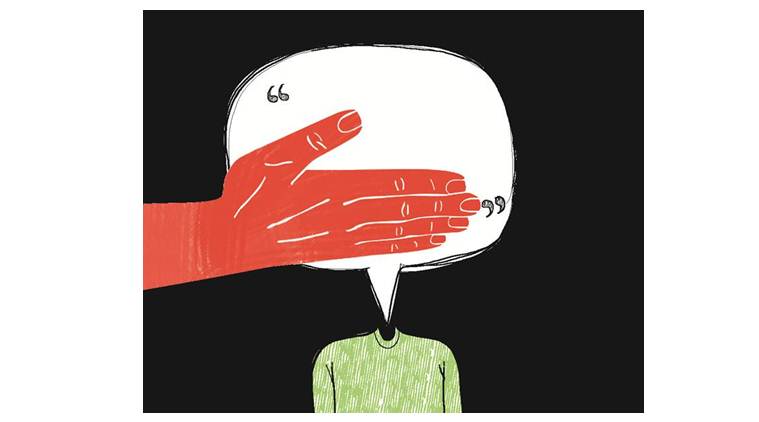Opinion Gained in Translation: Sahgal saga and sammelans
Whether it is Kashmir or the Marathi Sammelan, you cannot maintain the facade of democracy by trampling upon democratic values.

 Uninviting Nayantara Sahgal to the Sahitya Sammelan was an assault on her freedom of expression. (Illustration: Suvajit Dey)
Uninviting Nayantara Sahgal to the Sahitya Sammelan was an assault on her freedom of expression. (Illustration: Suvajit Dey)
(Written by Pradnya Daya Pawar)
2013. The 86th Akhil Bharatiya Marathi Sahitya Sammelan was to be hosted in January at Chiplun (Konkan). Senior author-critic Dr Nagnath Kottapalle presided over the Marathi literature summit. He had been officially elected as the president of the summit. Being a member of the Sahitya Parishad, I had voted for him. As a part of the Sahitya Sammelan, I was bestowed the presidentship of the (invited poets’) poetry summit.
However later, the organising body announced the naming of the main dais of the summit in honour of Shiv Sena chief Bal Thackeray, who had passed away a couple of months ago. He was a person who disparaged the Marathi literature summit calling it a cattle market, who extolled Hitler’s organisational skills, who trampled upon writers’ freedom of expression, who promoted violence. I was hoping that this announcement would create a wave of protests in literary circles. It did not happen. In the words of a senior Marxist thinker and critic D K Bedekar, there was an ‘obscene chill’ in the air. When I spoke to a few people for collective action, I was shocked to know that most writers felt Thackeray had made a significant contribution to Marathi. Some people agreed to register a protest at the venue. But the simple fact is: there was no protest.
I decided that I would not attend the Chiplun Sammelan if the name of the dais wasn’t changed. Meanwhile, news broke that Parashurama’s picture was printed on the programme cards. The Minister of State for Water Resources and the chairman of the summit’s welcoming committee, Sunil Tatkare, ruled out any possibility of reconsidering the decision to name the main dais. Therefore, I boycotted the summit. For this, I was criticised. Apparently, my position upset the organisers so much that then Union Cabinet Minister of Agriculture Sharad Pawar, in his opening remarks at the summit, felt it necessary to say, “Who are you? You have a misconception that the summit will not transpire if you do not attend.” The Chiplun Sahitya Sammelan transpired —in the presence of many politicians.
The point is, literary sammelans transpire whether a writer attends or not. In 2019, the Yavatmal Sahitya Sammelan transpired in the absence of the inaugurator. Nayantara Sahgal, a senior English writer, was invited to inaugurate the Sammelan. As is the norm, she sent her written speech to the organisers four days in advance. The organisers were perturbed when they read the speech. Sahgal’s speech critiqued the present dispensation in power, which supported a full-fledged attack on India’s diversity, tolerance, and impinged on the fundamental freedoms of Indian citizens.
The BJP MLA and the Minister of State for Energy, Madan Yerawar, was the chairman of the summit’s welcoming committee. The organisers did not want to hurt the sentiments of Madan Yerawar and his political conglomeration. The invitation was revoked. As an excuse, they referred to a few vague threats from a local MNS worker, who threatened to disrupt the literature summit if it was inaugurated by a non-Marathi personality. The reality was: after the news of the threat spread across Maharashtra, MNS chief Raj Thackeray made it clear that he didn’t oppose Sahgal’s speech.
Uninviting Sahgal to the Sahitya Sammelan was an assault on her freedom of expression. There were voices of dissent among the Marathi litterateurs. There is a unanimous agreement that the situation in the country is far worse now than 2013. Many poets, writers, journalists and editors decided to boycott the Sammelan — perhaps a first in the history of the Akhil Bharatiya Marathi Sahitya Sammelan. All eyes were on Aruna Dhere, the president of the Sammelan. After being appointed as a president, Dhere had made it clear that she would not tolerate any kind of politics. She remained true to her position. She attended the Sammelan and registered her protest in her speech.
Before I sign off, let me share a parable about politics. Before the Sahgal row, there was another raging topic. The manner in which Dhere was selected president of the Sammelan by doing away with the age-old tradition of electing a president. All these years, the Sammelan president was elected by around 1,200 voters. In the past few years, there have been whispers about unsavoury elements who have contaminated the election process. It was said that good and noble writers could not contest this election. And so, the elections were scrapped. As a result, the president was elected by 12-14 voters, instead of 1,500 votes.
This election reminds me of the recent local body polls in Kashmir. The major political parties boycotted the polls. The state saw an extremely low voter turnout. Later, when Kashmiri parties joined hands to stake claim to form the government in the state, the Assembly was dissolved.
Whether it is Kashmir or the Marathi Sammelan, you cannot maintain the facade of democracy by trampling upon democratic values. To sum up, I read an apt statement somewhere: Nayantaraji, do not forgive us. For we know what we’re doing!



